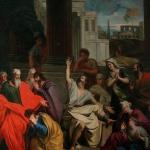I think a few of my students in my “Introduction to New Church Theology” class are getting frustrated with how often we talk about apparent inconsistencies in New Church theology. Today it was about salvation for polytheists (some passages indicate it’s possible, others indicate it’s not). In the past, it’s been about how a merciful God could let anyone go to hell. If I’m supposed to be championing this stuff, shouldn’t I spend less time focusing on these paradoxes and more time just talking about the parts that fit together neatly?
I don’t know how widespread that sentiment is, but I understand it, and I think I need to address it directly. For next class, I plan to make the following provocative statement: if you’re not wrestling with apparent contradictions in your field, then you’re not studying deeply enough.
As I see it, apparent contradictions are the places where we do the most learning. But we have to approach them the right way.
Take, for example, the following axiom from physics: light is both a wave and a particle. When faced with this statement, we could respond in the following ways:
1. The Fundamentalist
There can be no contradictions. One and only one of those options must be true. Light is a particle. Therefore, it is not a wave, and anyone who calls it a wave is a heretic.
2. The Skeptic
This is a fundamental contradiction in terms, and as such, it undercuts the entire field of study. Physics is utter nonsense.
3. The Mystic
Light is both a particle and a wave. This is incomprehensible to human minds, but it is true. It is a beautiful mystery, and any attempts to unravel it will only take away from the beauty. (For what it’s worth, I admit I’m partial to this one, minus the suggestion that attempts to unravel it are harmful – I don’t think this and the final approach need be mutually exclusive.)
4. The Scholar
Light seems to behave as both a particle and a wave. Those terms usually seem to be mutually exclusive. Let’s dig deeper into what a wave really is, what a particle really is, what light really is, and whether we might need some new kind of framework to understand how this part of the universe behaves.
You can apply the same thing in any number of disciplines. In history: was Thomas Jefferson a great philosopher of liberty or a slave-owning racist? In math: do negative numbers have square roots? The scholar delves into these questions, rather than dismissing them.
Because it is in grappling with these questions – rather than immediately picking a side, or dismissing the field, or embracing both unthinkingly – that we come to new and deeper understanding. It’s true for science, history, and math – and I think it’s true for religion as well. Being a scholar of theology – not just academically, but for anyone who seeks to understand God and faith better – means grappling with the apparent contradictions, and in so doing, deepening one’s faith.
What do you think? Am I right that deep studying always means grappling with inconsistencies? Can you think of examples from other fields?
And how has your faith deepened by grappling with some of these big questions?













